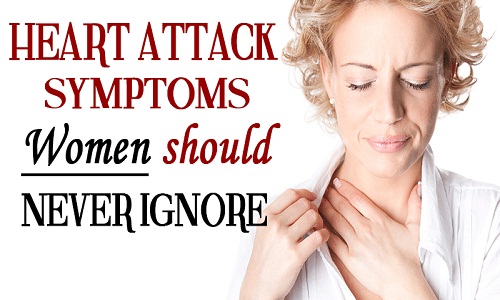Symptoms of Women's Heart Attacks - Heart Attack Symptoms in Women
When a heart attack strikes, it doesn’t always feel the same in women as it does in men.
Women don't always get the same classic heart attack symptoms as men, such as crushing chest pain that radiates down one arm. Those heart attack symptoms can certainly happen to women, but many experience vague or even “silent” symptoms that they may miss.
Feeling like you ran a marathon when, in fact, you haven’t even taken a step? The next few minutes of reading could save your life, or the life of a female loved one.
A heart attack, or a myocardial infarction, occurs when the heart lacks oxygen due to a blockage of the bloodstream to the heart. This blockage is usually caused by a build-up of plaque developed over time by matter such as cholesterol and fat. The longer the blood flow is blocked, the more damage it does to the heart muscle and the affected section of the heart begins to die. Three outcomes are evident, mild damage to the heart, severe complications as a result, and even death.
A heart attack strikes someone every 43 seconds. Please read that sentence again. Every 43 seconds.
Heart Attack Symptoms in Women
Women experience heart attacks quite differently from men. Heart disease is the number one killer of women in the United States, according to the American Heart Association. There are several symptoms women attribute to other disorders or illness and ignore the signs. This is why a heart attack is known as the silent killer. Let’s take a closer look at the subtle hints of heart attack symptoms for women.
- Chest pain or discomfort. Chest pain is the most common heart attack symptom, but some women may experience it differently than men. It may feel like a squeezing or fullness, and the pain can be anywhere in the chest, not just on the left side. It's usually "truly uncomfortable" during a heart attack, says cardiologist Rita Redberg, MD, director of Women’s Cardiovascular Services at the University of California, San Francisco. "It feels like a vise being tightened."
- Back, Neck, Jaw, or Arm Pain. A more common symptom in women than men is a sudden or gradual pain in the back, neck, jaw, or arm. It can radiate between these regions or be concentrated in one or more sections. It intensifies such that if asleep, it will wake you up. Cardiologists stress the importance of seeking medical attention for any atypical or unexplained symptoms in the upper body region.
- Stomach pain. Sometimes people mistake stomach pain that signals a heart attack with heartburn, the flu, or a stomach ulcer. Other times, women experience severe abdominal pressure that feels like an elephant sitting on your stomach, says cardiologist Nieca Goldberg, MD, medical director of the Joan H. Tisch Center for Women’s Health at NYU Langone Medical Center in New York.
- Cold Sweat
Breaking out in a cold sweat is often overlooked as a symptom of being overheated or the beginning of the flu. The distinguishing factor is the awareness of it being stress-related as oppose to perspiration. -
Sleep disturbances
a woman in bed unable to sleep possibly due to an oncoming heart attack
Difficulty getting to sleep and unusual waking may be issues before a heart attack.
Almost half of women in the 2003 study reported issues with sleep in the weeks before they had a heart attack.These disturbances may involve:
- difficulty getting to sleep
- unusual waking throughout the night
- feeling tired despite getting enough sleep
-
Heart attack post-menopause
The risk of heart attack increases due to falling estrogen levels after menopause.Post-menopause heart attack symptoms include:
-
pain or discomfort in the arms, back, neck, jaw, or stomach
-
rapid or irregular heartbeat
-
severe chest pain
-
sweating without activity
-
Fatigue.Experiencing an overwhelming feeling of being exhausted or tired was found to be one common symptom in the aforementioned survivor study. Nearly 71% reported fatigue was present for more than one month leading up to the incident.
One half of the study group also expressed sleep troubles during this time. The fatigue related to heart attacks is usually so severe that you physically have trouble functioning, let alone walking.
As everyone does not experience the same symptoms, it is important that you seek immediate medical attention with chest discomfort accompanied by any one of these symptoms.
Heart Attack Symptoms in Women Over 50
It may sound like a cliché, but women experiencing menopause are at a higher risk for heart attacks. Menopause causes various changes in our bodies including a reduction in estrogen hormone levels, which protect our heart. The heart attack signs in women we have discussed are for women of all ages; however, menopausal and post-menopausal women need to be aware of additional and enhanced symptoms such as:
- Pain or discomfort in arms, stomach, back, neck or jaw
- Severe chest pain
- Rapid or irregular heartbeat
- Profuse sweating
Heart Attack Risk Factors for Women
Women and men face higher risk for heart disease leading to a heart attack with high cholesterol, high blood pressure, and obesity. Women have a tendency to be at a higher risk than men with the following disorders and lifestyle choices:
- Age: Those aged 55 years or older are at greater risk of heart attack. This may be because hormones provide some protection from heart disease before menopause.
- Family history: Those with a male relative who had a heart attack by the age of 55 years old, or a female relative who has had one by 65 years of age, are considered to have a family history of heart attack and are at increased risk.
- Health status: Certain markers, such as high blood pressure and high-cholesterol, increases the risk of heart attack in both males and females.
- Medical conditions: Those with conditions, including diabetes, obesity, and autoimmune disorders are more likely to have a heart attack. Diseases such as endometriosis, PCOS, or a history of preeclampsia during pregnancy also increase risk.
- Lifestyle choices: Using tobacco or stimulant drugs, for example, cocaine or amphetamines, a sedentary lifestyle, or high levels of stress will all increase the risk of heart attack.
What NOT to Do
If you feel heart attack symptoms:
- Don’t delay getting help. "Women generally wait longer than men before going to the emergency room," says Rita F. Redberg, MD, MSc, FACC, director of Women's Cardiovascular Services for the UCSF Division of Cardiology in San Francisco. Even if you think your symptoms aren’t that bad or will pass, the stakes are too high.
- Don't drive yourself to the hospital. You need an ambulance. If you drive, you could have a wreck on the way and possibly hurt yourself or someone else.
- Don’t have a friend or relative drive you, either. You may not get there fast enough.
- Don’t dismiss what you feel. "Don't worry about feeling silly if you're wrong," Goldberg says. You have to get it checked out right away.
When to see a doctor
The British Heart Foundation recommend all women over 40 years of age have regular checks with their doctor. This helps identify risk factors early so that they can be treated. Early intervention reduces the chances of a cardiac event.
Anyone who notices the warning signs of a heart attack, such as the following, should see a doctor immediately:
- unusual fatigue
- shortness of breath
- upper body pain
A doctor will note symptoms, check blood pressure and heart rate, and may order blood tests or use an electrocardiogram (EKG) to see the heart's electrical activity.



